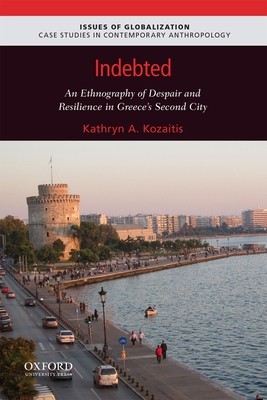
- We will send in 10–14 business days.
- Author: Kathryn A Kozaitis
- Publisher: Oxford University Press, USA
- ISBN-10: 0190090146
- ISBN-13: 9780190090142
- Format: 13.7 x 20.8 x 1.3 cm, softcover
- Language: English
- SAVE -10% with code: EXTRA
Reviews
Description
This engagingly written and deeply ethnographic work examines the economic and political factors that led to the Greek debt crisis, including financial pressures from international lenders, unregulated spending by the Greek government, predatory bank loans, and rising unemployment.
Indebted looks closely at the cultural dimensions of the crisis: how middle class urbanites experienced the shock of a global fiscal collapse, managed societal instability, and worked to sustain their families in the face of structural pressures, local instabilities, and moral imperatives. Author Kathryn A. Kozaitis based her analysis on ethnographic research in Thessaloniki, the second largest city and co-capital of Greece, during the summer of 2009, 2011-2012, and ethnographic updates in 2013-2019. She places particular emphasis on the lived experience of Thessalonikians in what emerged as a culture of crisis--collective, patterned behaviors, thoughts, and emotions characteristic of a people in sociocultural transformation--in an uncertain present marked by past realities and future imaginaries. The book synthesizes hundreds of crisis narratives, depicting Thessalonikians' responses to their country's political disaster and downward mobility through the themes of loss anddisplacement; blame and accountability; reconfigurations of kinship roles and responsibilities; emotional and intellectual awakenings; and emergent indicators of survival, continuity, and renewal through alternative praxis. Indebted is a volume in the series ISSUES OF GLOBALIZATION: CASE STUDIES IN CONTEMPORARY ANTHROPOLOGY, which examines the experiences of individual communities in our contemporary world. Each volume offers a brief and engaging exploration of a particular issue arising from globalization and its cultural, political, and economic effects on certain peoples or groups.
EXTRA 10 % discount with code: EXTRA
The promotion ends in 18d.01:36:25
The discount code is valid when purchasing from 10 €. Discounts do not stack.
- Author: Kathryn A Kozaitis
- Publisher: Oxford University Press, USA
- ISBN-10: 0190090146
- ISBN-13: 9780190090142
- Format: 13.7 x 20.8 x 1.3 cm, softcover
- Language: English English
This engagingly written and deeply ethnographic work examines the economic and political factors that led to the Greek debt crisis, including financial pressures from international lenders, unregulated spending by the Greek government, predatory bank loans, and rising unemployment.
Indebted looks closely at the cultural dimensions of the crisis: how middle class urbanites experienced the shock of a global fiscal collapse, managed societal instability, and worked to sustain their families in the face of structural pressures, local instabilities, and moral imperatives. Author Kathryn A. Kozaitis based her analysis on ethnographic research in Thessaloniki, the second largest city and co-capital of Greece, during the summer of 2009, 2011-2012, and ethnographic updates in 2013-2019. She places particular emphasis on the lived experience of Thessalonikians in what emerged as a culture of crisis--collective, patterned behaviors, thoughts, and emotions characteristic of a people in sociocultural transformation--in an uncertain present marked by past realities and future imaginaries. The book synthesizes hundreds of crisis narratives, depicting Thessalonikians' responses to their country's political disaster and downward mobility through the themes of loss anddisplacement; blame and accountability; reconfigurations of kinship roles and responsibilities; emotional and intellectual awakenings; and emergent indicators of survival, continuity, and renewal through alternative praxis. Indebted is a volume in the series ISSUES OF GLOBALIZATION: CASE STUDIES IN CONTEMPORARY ANTHROPOLOGY, which examines the experiences of individual communities in our contemporary world. Each volume offers a brief and engaging exploration of a particular issue arising from globalization and its cultural, political, and economic effects on certain peoples or groups.


Reviews